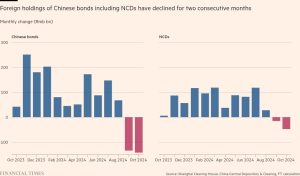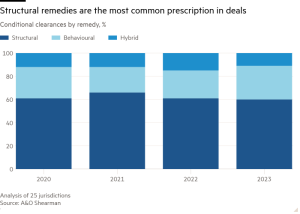Hundreds of cosmetic goods contain toxic substances, says EU agency
Stay informed with free updates
Simply sign up to the Retail & Consumer industry myFT Digest — delivered directly to your inbox.
Hundreds of everyday cosmetics products sold in the EU contain toxic substances, the European Chemicals Agency has found, increasing scrutiny of the use of harmful substances in make-up, lotions and hair products.
The agency said on Wednesday that it checked 4,686 products available from 345 companies in 13 European countries as part of an effort to ensure that the bloc’s chemicals rules are being properly enforced.
It found that six per cent of the products, among them widely used suncreams and lip-liners, contained chemicals that are restricted in the EU due to their harmful impact on human health and the environment.
The agency said many of the products contained perfluoroalkyl and polyfluoroalkyl substances, known as PFAS, some of which are banned under EU rules.
The substances have been linked to health issues ranging from reduced fertility to an increased risk of cancer and hormone disruption. PFAS are also referred to as “forever chemicals” — they are difficult to break down and are used in products including packaging, batteries, non-stick cookware and waterproof clothes.
Over the course of this year, the EU’s alert system for dangerous products identified PFAS in goods including lipliners by Italian beauty brand Diego Dalla Palma, hair products by US group L’Anza and eyeliners by Swedish cruelty-free make up brand LH Cosmetics.
Trade group Cosmetics Europe said the results of the survey were “disappointing”.
“As the report recognises, the lesson for the industry is that we need to raise awareness of the broader range of restrictions which can apply to cosmetic products,” the group said.
Linda Hellqvist, chief executive of LH Cosmetics, said the company had reworked its ingredients for crayon eyeliners and that the product line no longer included any PFAS substances.
“We have consistently acted on the current known legislation and restrictions for the industry and would never knowingly put our customers or the environment at risk,” she added.
The European Chemicals Agency (ECHA) is working on a proposal from five EU member states to introduce a mass restriction on the 10,000-plus group of PFAS under the bloc’s wide-reaching Reach chemicals regulation.
But the process will take months and has been heavily contested by businesses, which argue that it could have severe consequences on industries that rely on them for production of critical technologies such as semiconductors.
Thirteen national enforcement agencies took part in the project, often discovering the presence of the banned substances by checking ingredients lists or the information available about the product online.
ECHA said recent developments in EU chemicals legislation should be “followed carefully” by the industry and recommended that the European Commission set up a “European Testing Facility” that could analyse products for PFAS.
The agency told the Financial Times that enforcement of chemical rules “is rarely done before products are placed on the market”.
In the report, ECHA said consumers should check cosmetics closely for perfluorononyl dimethicone and cyclopentasiloxane, the two most common banned substances found in the study.
Sandra Jen, lead on health and chemicals at the Health and Environment Alliance NGO, said: “Consumers must have the guarantee that products on the EU market are safe and comply with regulations.”
Tatiana Santos, head of chemicals policy at the European Environmental Bureau, said it was a “profound failure of corporate responsibility and regulatory action that chemicals, deemed too dangerous for EU approval, persist in products consumers trust every day”.
The EU ombudsman last week said EU officials had broken the bloc’s rules by failing to meet deadlines for decisions on whether to ban dangerous chemicals.
“These delays represent a threat to human health and the environment as companies are able to continue using the chemical substances, which may be carcinogenic, mutagenic, toxic for reproduction, or have endocrine disrupting properties, during the authorisation process,” the ombudsman said.
The European Commission said that proper enforcement of the rules, for which EU governments are responsible, was “instrumental” in order to protect consumers.
#Hundreds #cosmetic #goods #toxic #substances #agency




